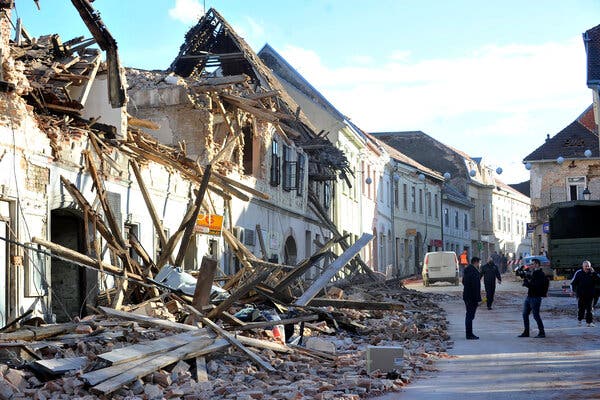Earthquake in Croatia
The clouds of danger and adversities are lingering over Croatia after the country suffered the worst earthquake in nearly 140 years, for the second time in a row this year. The appalling tremble led to the demise of seven people, causing destruction at epicenter which rumbled to parts of Rome, Vienna and other European countries. The Richter scale measure of the earthquake stands at 6.3 magnitude as declared by European-Mediterranean Seismological Centre on Tuesday which was more terrifying than the 5.2 quake on Monday and similar tremor owing to $6 billion damage which struck the capital Zagreb in March.
The earthquake shrouded the town of Petrinja causing a devastating havoc, bringing down buildings and killing seven people as said by Deputy Prime Minister Davor Bozinovic to the TV. Among the deceased there were a girl of 13, a father and a son. Several buildings fell in the most atrocious way leading to a fatal economic, political and social damage as told by Prime Minister Andrej Plenkovic at the scene. Authorities made efforts to evacuate the hospital in the city of Sisak and tremor eroded the structures in Zagreb, where people came out of their homes to prevent the repercussions and aftermaths ruling the catastrophe.
"2020 has been a tragic year for the country and world, killing people either due to virus ravages or natural disasters," Plenkovic said on N1 television. The news channels highlighted that about 20 people have encountered minor injuries and have been hospitalised while 2 are battling in fatal conditions. This disaster has worsened the situation after the March earthquake for the Adriatic European Union Member state. The difficult year didn't provide a sigh of relief to the country due to economic recession, covid crisis and hideous damage to around 20,000 buildings. The US Geological Survey brought out the intensity of the earthquake by terming it as the nation's strongest tremble after the advent of modern seismic instrumentations. The President Zoran Milanovic was horrified after the incident and ordered the army to take over and salvage the victims by transferring them to a safer place.
The government lifted the sanctions imposed on international travel in view to prevent covid spread, so that disaster struck citizens can flee to their relative's houses for shelter. The quake led to the automatic shutdown of Slovenia’s Krsko nuclear power plant. No damage has been caused to the plant as assured by the country's infrastructure minister. The country released funds worth 120 million kuna ($19.4 million) for relief and welfare of victims. Hungary and Slovenia extended a supportive hand while European Commission President Ursula von der Leyen announced help on twitter after exchanging words with Plenkovic. Janez Lenarcic, the EU’s commissioner for disaster relief will pay his visit to Croatia on Wednesday with help including winter tents, electric heaters, sleeping bags and housing containers.




The Brief. Sign up to receive the top stories you need to know right now.